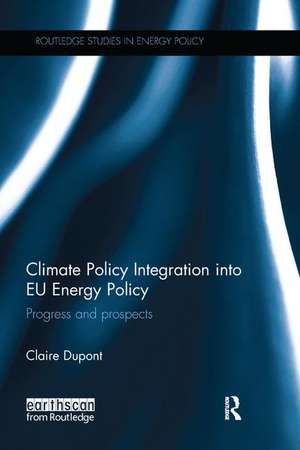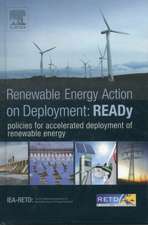Climate Policy Integration into EU Energy Policy: Progress and prospects: Routledge Studies in Energy Policy
Autor Claire Duponten Limba Engleză Paperback – 26 apr 2017
This book explores the integration of long-term climate policy objectives into EU energy policy. It engages in-depth empirical analysis on the integration of climate policy objectives into renewable energy policy; energy performance of buildings; and policies in support of natural gas importing infrastructure. The book describes insufficient levels of climate policy integration across these areas to achieve the long-term policy goals. A conceptual framework to find reasons for insufficient integration levels is developed and applied.
This book is a valuable resource for students, researchers, academics and policymakers interested in environmental, climate change and energy policy development in the EU, particularly from the perspective of long-term policy challenges. The book adds to scholarly literature on policy integration and EU integration, and contributes to new and developing research about EU decarbonisation.
| Toate formatele și edițiile | Preț | Express |
|---|---|---|
| Paperback (1) | 396.29 lei 6-8 săpt. | |
| Taylor & Francis – 26 apr 2017 | 396.29 lei 6-8 săpt. | |
| Hardback (1) | 1162.84 lei 6-8 săpt. | |
| Taylor & Francis – 5 oct 2015 | 1162.84 lei 6-8 săpt. |
Din seria Routledge Studies in Energy Policy
-
 Preț: 289.19 lei
Preț: 289.19 lei -
 Preț: 449.41 lei
Preț: 449.41 lei -
 Preț: 449.41 lei
Preț: 449.41 lei -
 Preț: 322.97 lei
Preț: 322.97 lei - 13%
 Preț: 323.91 lei
Preț: 323.91 lei -
 Preț: 449.41 lei
Preț: 449.41 lei -
 Preț: 449.41 lei
Preț: 449.41 lei - 18%
 Preț: 144.26 lei
Preț: 144.26 lei -
 Preț: 385.92 lei
Preț: 385.92 lei -
 Preț: 389.38 lei
Preț: 389.38 lei -
 Preț: 389.38 lei
Preț: 389.38 lei - 17%
 Preț: 270.61 lei
Preț: 270.61 lei -
 Preț: 416.22 lei
Preț: 416.22 lei -
 Preț: 382.65 lei
Preț: 382.65 lei -
 Preț: 389.07 lei
Preț: 389.07 lei -
 Preț: 387.75 lei
Preț: 387.75 lei -
 Preț: 389.66 lei
Preț: 389.66 lei -
 Preț: 381.98 lei
Preț: 381.98 lei - 17%
 Preț: 259.98 lei
Preț: 259.98 lei - 17%
 Preț: 259.98 lei
Preț: 259.98 lei - 18%
 Preț: 1005.80 lei
Preț: 1005.80 lei -
 Preț: 384.27 lei
Preț: 384.27 lei - 18%
 Preț: 1000.27 lei
Preț: 1000.27 lei
Preț: 396.29 lei
Nou
Puncte Express: 594
Preț estimativ în valută:
75.85€ • 79.69$ • 63.75£
75.85€ • 79.69$ • 63.75£
Carte tipărită la comandă
Livrare economică 11-25 martie
Preluare comenzi: 021 569.72.76
Specificații
ISBN-13: 9781138065024
ISBN-10: 1138065021
Pagini: 208
Dimensiuni: 156 x 234 mm
Greutate: 0.45 kg
Ediția:1
Editura: Taylor & Francis
Colecția Routledge
Seria Routledge Studies in Energy Policy
Locul publicării:Oxford, United Kingdom
ISBN-10: 1138065021
Pagini: 208
Dimensiuni: 156 x 234 mm
Greutate: 0.45 kg
Ediția:1
Editura: Taylor & Francis
Colecția Routledge
Seria Routledge Studies in Energy Policy
Locul publicării:Oxford, United Kingdom
Public țintă
Postgraduate and UndergraduateCuprins
1. Introduction 2. From environmental to climate policy integration 3. EU renewable energy policy 4. EU policy on the energy performance of buildings 5. EU policy on natural gas import infrastructure 6. Explaining climate policy integration: policy, politics, context and process 7. Conclusions
Recenzii
"This excellent work will be of interest to those working in environmental and climate policy integration and to anyone trying to promote climate-change policy in the EU. It contributes to the emerging body of research on CPI by offering a well-thought-through framework for measuring and explaining different levels of integration – particularly useful for assessing climate mainstreaming in policy output. For the policy process, stakeholder participation may need to be assessed using other indicators. Pro-climate stakeholders perhaps chose not to be more involved in renewable energy and energy conservation policies because DG Energy was pursing the same objectives – to increase the share of renewables in the EU and reduce energy consumption." – Environmental Politics, Catarina Cardoso
Descriere
This book explores the integration of long-term climate policy objectives into EU energy policy. It engages in-depth empirical analysis of the integration of climate policy objective over renewable energy policy; energy performance of buildings; and policies in support of natural gas importing infrastructure. Addressing how insufficient level of climate policy integration across these areas affects the long-term policy goals and a conceptual framework to find reasons for insufficient integration levels is included.












